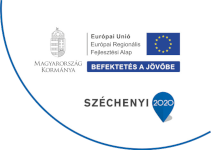
Medical doctors, dentists, pharmacists, and many more PhD students were delivering their presentations at Central for Translational Medicine's 3-Month progress report.
The Center for Translational Medicine's three-month progress report was held at Semmelweis University in early December. The opening speech was given by Mahmoud Obeidat, who spoke about the student's progress and the importance of their work. “Today, I think we all agree that we have one common vision to achieve, which is bringing science back into healthcare. To achieve our vision, we must have a very strong mission to do. Since we are here, we all want to make breakthrough change in Hungary. We believe in innovation.” Obeidat reported that this year 89 students have started the PhD program with 89 different visions, and only two of them gave up the scientific work.
The translational medicine cycle was established a few years ago with international collaborators, including Nobel laureates. It has four key elements. Number one is to have the best clinical question to ask. “If we can answer this question, then we have the knowledge. And I must stop here and say that no matter how important your clinical question is, how important your results are, if it's not treated and published, it doesn’t exist. Only if it's published, it can be implemented into clinical practice, which is the fourth element, science into healthcare.” Obeidat also highlighted that the translational medicine program is hybrid. The participants have to focus on scientific activities and clinical practice as well. In the program’s first year, the students have four days dedicated to scientific activities and only one day to clinical practice. Next year they won’t have this dedicated time to their projects, they will have four days for clinical practice and only one day for scientific activities. From this September, two hundred and ten projects are running. This might have huge clinical benefits, if can be directly implemented into clinical practice.
First-year PhD students (51 participants) are mainly doctors and dentists (19 participants), but also pharmacists and other health professionals. Sixty-seven percent of students were women and twenty-nine percent were men. So double number of females compared to males. Dentist and Gastroenterology Group were the most represented group at the progress report, many of them were delivering their presentations. The Cardiology-Intensive Group, the Pediatrics Group, and the Gynecology-Urology Group also had more than ten participants in the progress report. Fewer than ten people, but still a significant number, were presented in the Dermatology-Immunology Group and the Miscellaneous Group. The research and topics presented by the students were very diverse, even within their respective fields.
Dentistry, cardiology and intensive therapy
The Dentist Group's PhD topics covered several aspects, including prostheses and implants, optical and mechanical properties of dental ceramics, mechanical and optical properties of enamel and dentin. There were presentations on periodontal diseases as well. One student evaluated the latest advances in digital orthodontics in his PhD work. An interesting research topic is about exploration of HPV-associated diseases in different anatomical areas and their prevention. Two PhD students are exploring the application of artificial intelligence in their PhD work, which is another interesting topic. Oral surgery was not missing from the research topics. The topics of the Cardiology-Intensive Group were also varied. Some explored the topic of cardiac catheterization, while others focused on valvular heart disease. There was a PhD student, who works on the role of chronic systemic inflammation in cardiological disease. Also of interest was a study looking at diagnostic and therapeutic options in sepsis and trauma-associated coagulopathy. The consequences of inappropriate antibiotic use in the intensive care unit were also an important topic.
Pediatrics and gastroenterology
Several of the themes of the Pediatrics Group were related to pediatric oncology. Some of them identified biomarkers in polyposis syndromes or the role of the gut microbiota in cystic fibrosis. Another interesting PhD topic investigated the role of physical activity in inflammatory bowel disease. Another topic was the research on eating and feeding difficulties in children with autism spectrum disorder. Many of the Gastroenterology Group's PhD work has been on pancreatic disease, including pancreatic insufficiency, inflammation, and cancer. One presentation focused on the relationship between diabetes mellitus and pancreatic disease. Another study looked at the cardiovascular complications of acute pancreatitis, while another was researching the relationship between pancreatitis and psychological conditions. There was also presentation work on the oncological and surgical outcomes of colorectal cancer surgery, and the impact of obesity on the course and outcome of acute inflammatory diseases. A lighter topic was exploring the benefits of physical activity in everyday life. Two PhD topics were related to space exploration, one on optimizing the use of medicines during space travel, and the other on the adaptation of humans to spaceflight.
Gynecology-urology, dermatology-immunology and other specialities
Among the topics of the Gynecology-Urology Group, there were some related to tumors, while others focused on the treatment of pelvic pain syndromes. One study looked at oncoplastic breast surgery, trying to find the best techniques. There was PhD work on changes in the vaginal flora of pregnant women, while others focused on improving women's quality of life after childbirth and preventing postpartum complications. There was research on the effect of paternal age on the development of congenital malformations. An exciting topic was the effect of oral contraceptives on metabolic balance. There is also a PhD work focused on finding more effective therapies for penile cancer. The topics of the Miscellaneous Group were also varied. There was one that explored the relationship between metabolic syndrome and cognitive dysfunction in schizophrenia, and another that aimed to predict the risk of dementia. In addition to psychiatric topics, there were PhD works that compared different therapies for shoulder pain, or investigated the prevention and treatment of acute ischaemic stroke.
Check out the photos of the event here:
https://www.facebook.com/media/set/?vanity=tmalapitvany&set=a.754724566698915
(Szabó Emese)
